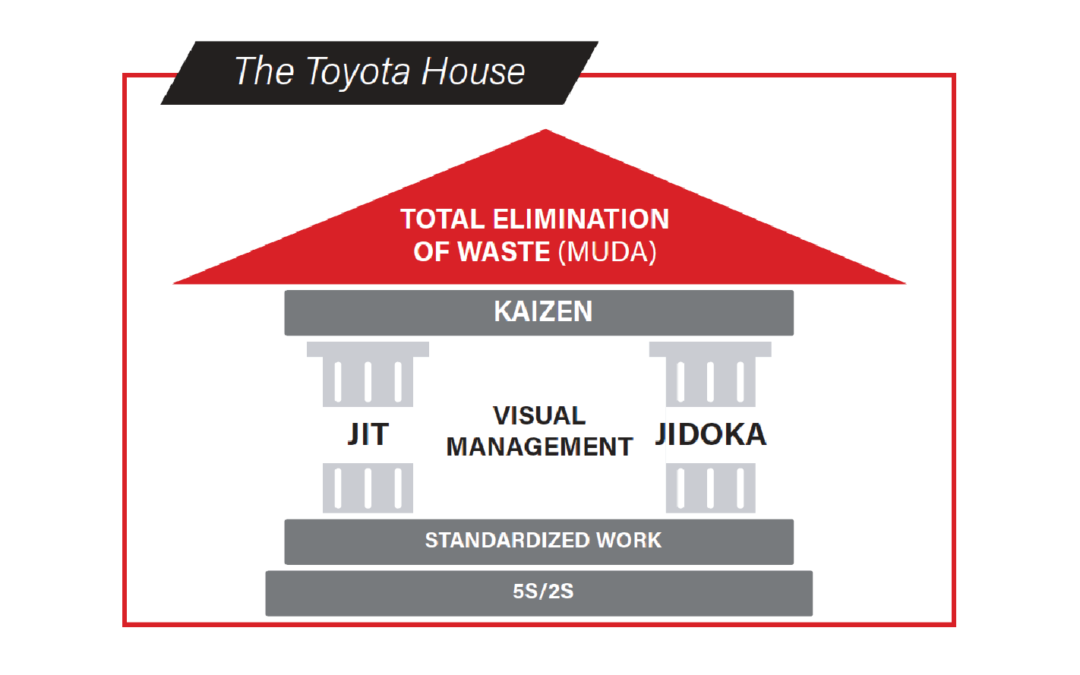Lean Management – A High-level Overview
Coined “Lean” in the 1990s, Lean Management is a philosophy based on the Toyota Production System (TPS). The objective of Lean is to eliminate everything that does not add value from the standpoint of the end user. The approach facilitates shared leadership and responsibility and continuous improvement of all work process, purpose, and people. The management method acts as a guide to building a successful and solid organization that is constantly progressing, identifying real problems, and resolving them for unprecedented results.
“The key to the Toyota Way and what makes Toyota stand out is not any of the individual elements. What is important is having all the elements together as a system. It must be practiced every day in a consistent manner – not in spurts.”
Taiichi Ohno, the Father of the Toyota Production System
Lean Done Right: People are Gold, Problems are Treasures
Most of us have heard of Lean management and the emphasis on removing waste to deliver higher value. Yet that is only one dimension, and not the powerhouse that fuels the approach. In Lean, people are gold – the human dimension is the single most important element for success. The silver bullet is the respect for people as a foundation for that work. The word “respect” means different things to different people, but in the context of Lean, it has a very definitive meaning, which is to engage and empower the people closest to the work so that they can assess the current condition, create solutions to problems and standardize what’s working.
In Lean, problems, like people, are also treasures. Without problems, there are no opportunities to advance. In fact, if you think it is good to have no problems then you have a much bigger one — you are not improving. Within the construct of Lean, to succeed you must create an environment where team members are willing to see and report problems and engage in solving them. When a company engages its people in problem solving as part of their daily work, they feel more motivated, they do their jobs better, the organization’s performance improves, and a virtuous cycle starts to turn.
Moreover, when you go to the place where the work is done, you get ideas on how the process can be revamped to better suit and add more value to the customer. This Lean ideology or concept is called “going to the Gemba.” It enables the employees to think independently, act as a team, and develop the confidence and motivation to make decisions that enhance innovation. “Going to the Gemba” allows a business to capture the most innovative ideas and bring them to life.
Lean as a Growth Strategy
According to a recent interview with Travis Bradley, Process Improvement Manager and Lean Management Expert at Shoppa’s Material Handling (Shoppa’s), “Many people think that Lean is about cutting heads, reducing the work force, or cutting inventory. But the truth is that Lean is really a growth strategy. When a company is fully staffed, but the employees are overloaded, that stunts growth and hurts morale,” Bradley explained. “Many company leaders think the solve is to hire more employees to help shoulder the heavy workload, however, that is not optimal. Healthy growth comes from employing Lean management which reduces inefficiency and frees up your current employees to refocus their energy. As employees improve work processes, they find ways to improve quality and provide additional and improved customer results. It is quality not quantity. The upshot of Lean is having engaged employees doing more value-added work. It’s about doing more with less and empowering the teams within.”
The Benefits of Lean: The 360-Degree View
If you ask people within an organization about the benefits of Lean management, you will get three different answers based on their unique point of view:
-
- The Associate: Increases pay and bonuses, adds job security, and makes my job safer and less stressful.
- The Manager: Increases productivity and morale, lowers defects, and makes training easier and more effective.
- The CEO: Increases sales, profits, and customer satisfaction, and lowers costs.
The fact is that they are all accurate. It is a win-win-win for all.
Why You Need a Lean Consultant
The advantages of using a Lean consultant can be profound. Here are just a few of the reasons that Lean consulting increases your chances of success:
Lean is not a short-term fix. Rather, it is a different way of thinking about almost every aspect of business. Halfhearted implementation attempts simply don’t stick. Your Lean consultant can see farther down the path based on past experiences and help you put practices in place that will empower your team to succeed.
Through a proven process of visualization, organization, and standardization, when you partner with Shoppa’s we will enable you to identify inefficiencies and implement changes that will change the dynamic of your culture for unprecedented results for the company, employees, and customers.
Put simply, according to Brady Muller, Lean Management Expert Consultant and Service Operations and Process Improvement Manager at Shoppa’s Material Handling. “Our goal is not just to help you solve problems, but to teach you so well, that soon you no longer need our help, as you will be able to solve them yourself moving forward. So, you’ll no longer need us.”
To learn more about Shoppa’s Lean Management Consulting, contact us today at 866-506-2200.


